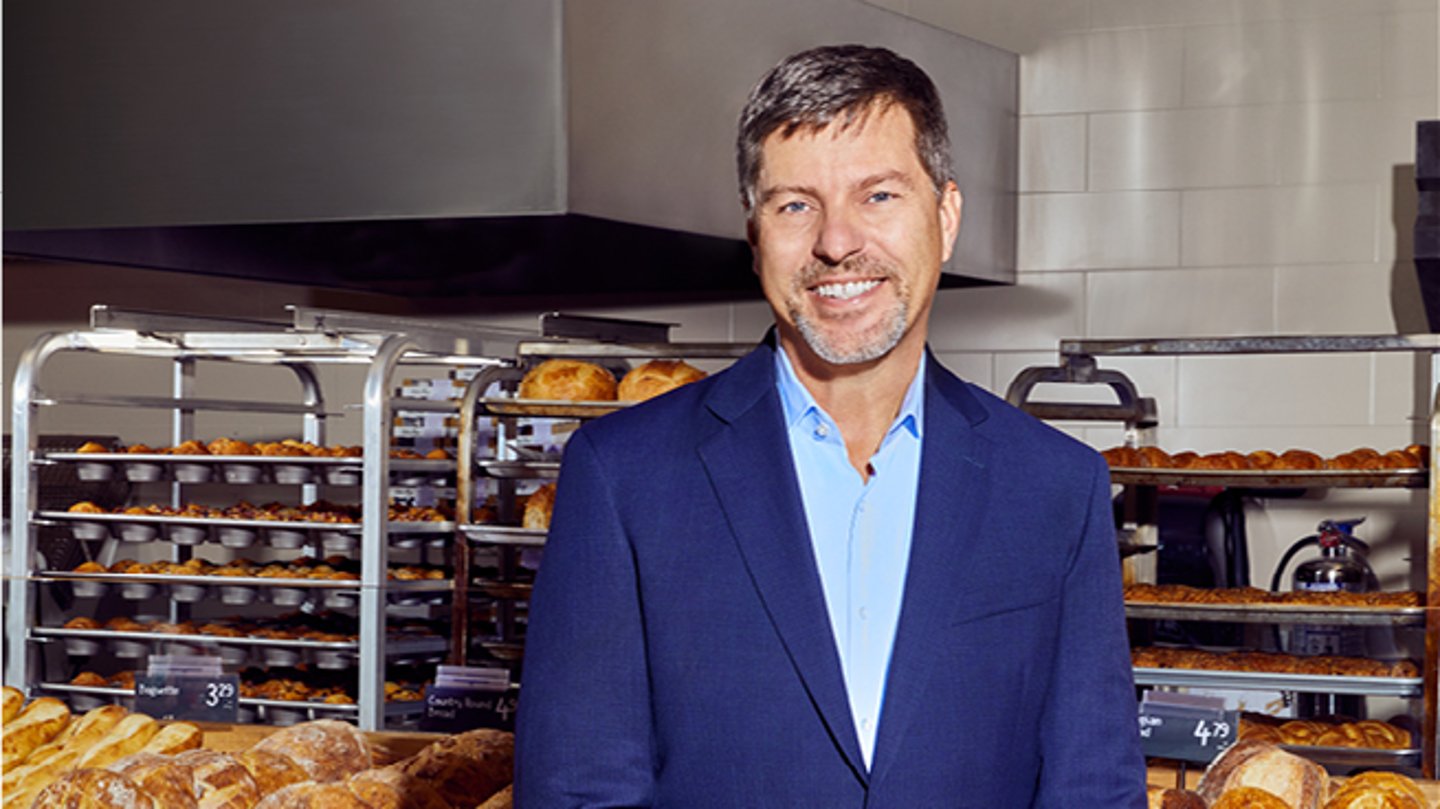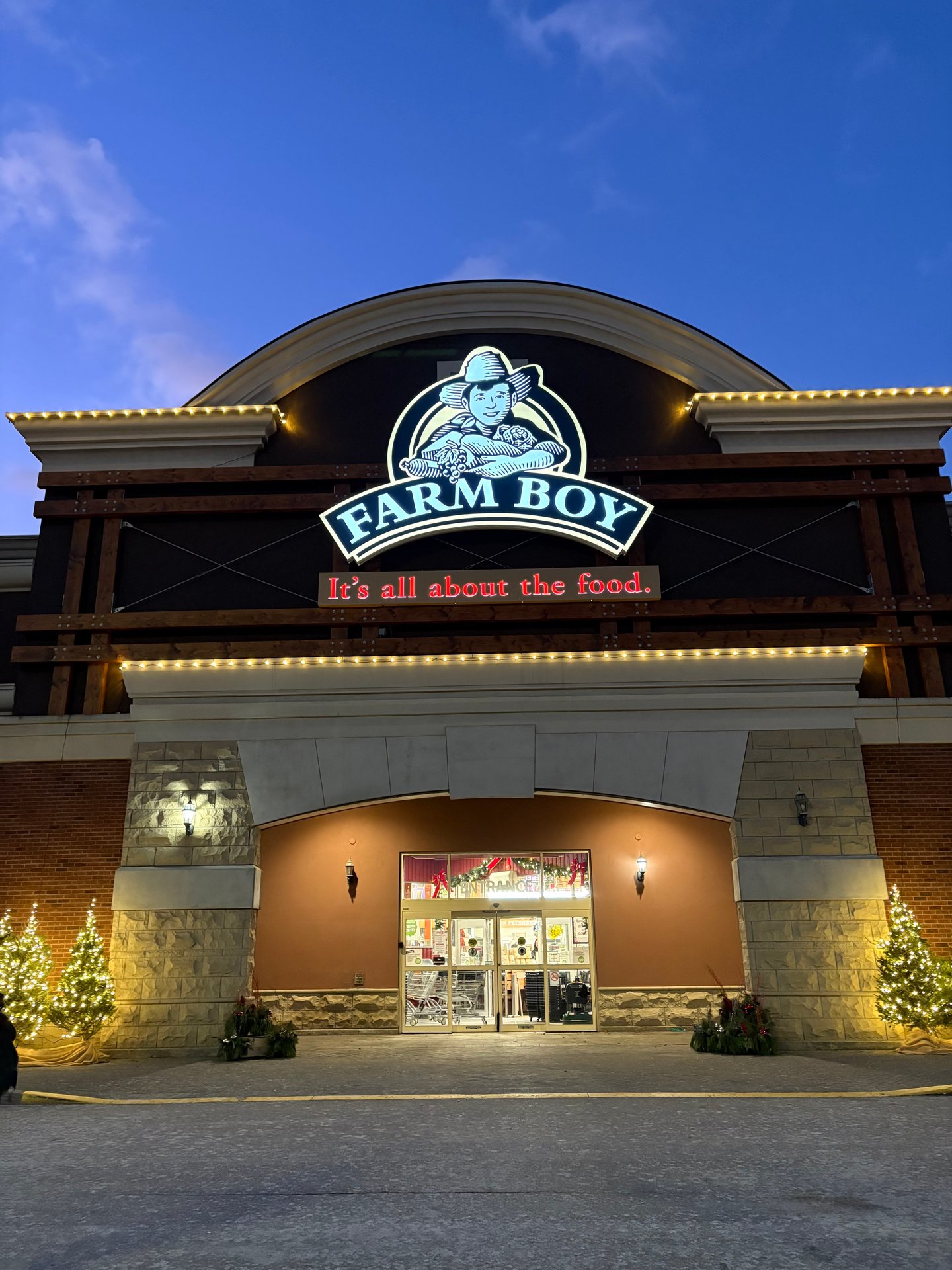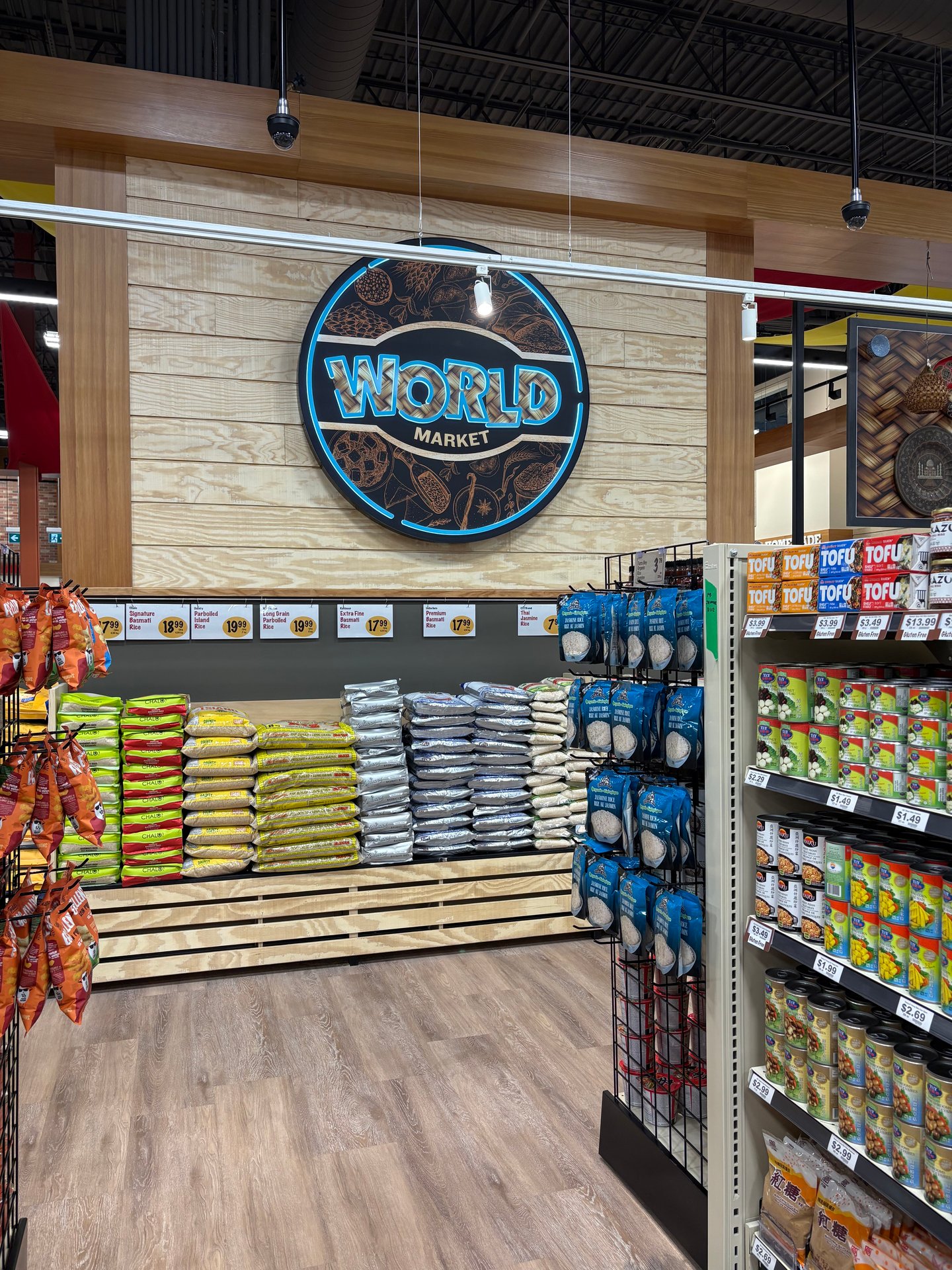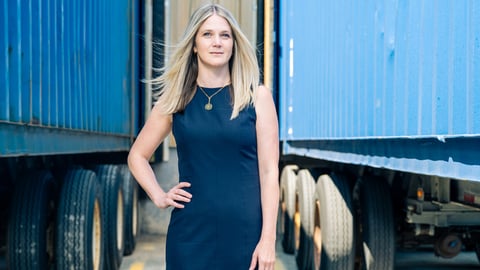Farm Boy president and general manager Shawn Linton on delivering fresh experiences
The holidays are approaching and warm fairy lights dance against the harsh winter's wind, twinkling on the miniature trees outside the store. But, the bone-cutting chill hasn’t dampened the spirits of the crowd gathered outside, eagerly waiting to walk the aisles of Toronto's newest Farm Boy. It’s a bit of a frenzy, really
Grocery store openings typically draw a crowd. There’s something different about this Farm Boy, though. At approximately 40,000 square feet, the store nestled within a strip mall in the upscale Leaside neighbourhood lists approximately 800 products that aren’t found at other Farm Boy locations, including paper products, an area dedicated to international food and beverage items, as well as household cleaners, pet food and alcohol.
PHOTO GALLERY: Farm Boy’s new one-stop Toronto shop
“We listened to our customers over the last several years,” says Farm Boy president and general manager Shawn Linton. “They kept asking, ‘Why can’t we have more grocery [items] in the stores?’ And teaming up with Empire allowed us to do it very easily because this is what they do, and they do it extremely well. And so ... let’s do it right. There’s no reason not to.”
Product selection isn’t the only thing that’s grown since Farm Boy’s acquisition by Empire Company Limited in 2018. The chain has expanded from 26 to 51 stores across the province, ranging from 12,000 square feet to more than 40,000 square feet in size. (The Leaside location is store No. 51.) Linton says Empire, the parent company of Sobeys and Longo’s, brings a wealth of expertise that has positively impacted various aspects of Farm Boy’s operations.
Linton, who has been with Farm Boy since 1996, says before the acquisition, the retailer had to navigate its own way through challenging times. This is no longer the case. “We’re always getting advice [from Empire] on how to improve our [customer] experience, our business," he says. "They helped us with warehouses, distribution, supply chain, buying, IT, partner relationships and then real estate is the big piece as well.”
Previously home to a Sobeys store, the Leaside location was completely gutted—except for the wall-to-wall coolers in the frozen food section—and only took six months to renovate, which is a fraction of the 12 to 18 months it typically takes for these types of projects.
The Leaside store opened in mid-December under the new brand platform, “A Farm Boy Fresh Twist.” More than a campaign tagline, Linton says it’s a master brand strategy designed to encapsulate what it means to “lead in fresh” and to help bring a fresh market experience to life.
“A Farm Boy Fresh Twist is what we’ve named it and we plan to roll that out across all our stores,” says Linton. “It’s a way to articulate to our teammates and to our customers and to everybody that comes into our stores what we do and what we stand for—our integrity and what we’re all about.”
Farm Boy was founded in 1981 by Jean-Louis and Colette Bellemare in Cornwall, Ont., with a concept to combine the feel of a farmers market with the convenience of a traditional grocery store, emphasizing fresh, local and organic foods. (Even Farm Boy’s official mascot, Lulu the cow, and other farmyard characters reflect the company’s agricultural roots.)
“Fresh is a fixed mindset for us,” says Linton. “It’s always going to be dominant in our stores and that’s where we always want to lead and [where] we can lead.”
The strategy will roll out across Farm Boy’s store network, he says, and smaller stores will start carrying “more relevant products.”
The selection at the Leaside store certainly lives up to the new brand ethos, realized in the assortment of freshly prepared grab-and-go items including shrimp, chicken and cauliflower bowls, soups and salads.
A Chef’s Market counter offers wraps, sandwiches and ready-to-heat items including glazed salmon, grilled chicken, pot pies and a selection of sides. Most of the items are prepared in-store or at Farm Boy’s commissary, though there are a few exceptions produced by outside vendors in Ontario, many of whom have established long-term relationships with the grocer.
“We’re always trying to be as fresh as possible,” says Linton of Farm Boy's fresh-made products. “We’re always trying to have that great customer experience. We use every resource we can to achieve that.”
To help deliver on its commitment to freshness, in 2004, Farm Boy developed a proprietary inventory management system after being unable to find a third-party option that met its needs. The system handles all Farm Boy’s fresh products—from produce to meat, cheese and commissary prepared options.
“It’s really the end-to-end solution that allows us to keep products as local as possible, with minimal product handling to keep freshness and quality,” explains Linton, who was involved in the system’s design. “Combined with precise data and tracking technology and our same-day fleet delivery systems, it’s what allows us to deliver on our promise to our customers of fresh and quality products every day.”
Dedication to fresh truly comes to life in the brightly lit produce department, just inside the main doors. Fresh berries, juicy green grapes, organic leafy lettuces and bunches of bananas are arranged in neat, inviting displays. A lot of what is sold in the produce department is sourced locally, when and wherever possible.
“There’s a lot to discover [in the Leaside store] and it changes all the time—from beautiful cantaloupe, beautiful cauliflower to beautiful broccoli, to fantastic cherries to the grapes that we have. It’s part of the market experience,” says Linton.
The emphasis on local extends beyond the produce department. Farm Boy’s prepared foods and many of its bakery items are made using locally sourced ingredients. The grocer also offers a wide range of local dairy products as well as locally sourced meats and seafood.
Partnerships with local vendors are central to Farm Boy’s private-label product development as well, which is a hallmark of the retailer. Today, there are more than 2,000 store-brand products, a number that has grown from 650 since 2018. More than 50% of its private-label suppliers are based in Ontario, contributing significantly to the success of Farm Boy’s private-label brand, says Linton.
READ: As consumers search for value, Farm Boy delivers with its stable of private-label products
“We keep our products fresh; we don’t have warehouses chock-full of inventory, they’re delivered fresh to the store every day,” he says. “Local plays a part in [the private-label program's] success. The other part is we have a good culinary team and we listen to our customers very closely.”
The team is always innovating and moves quickly to capitalize on culinary trends or emerging opportunities—in some cases going from idea to shelf in as little as nine weeks, according to Farm Boy.
Vegan and gluten-free items as well as non-alcoholic beverages have proven popular among Farm Boy customers, for instance. And in terms of white space opportunities, the retailer remains focused on products that satisfy dietary or lifestyle needs, says Linton.
“There’s so many ideas,” he says. “We look at that and we say, OK, is there a fit? Is the vendor local? Is [the product] made in small batches? What’s the unique selling proposition of our product? How does it help our customer? Is it relevant for our customer? And we’re totally open-minded about that.”
If there’s a challenge in maintaining such a large private-label portfolio, it’s giving suppliers the time and attention they deserve, says Linton. “Vendor relationships are very important for us. It’s like growing a family,” he says. “As your family gets bigger, you have less time to go around. So, that’s the challenge. It’s not easy to give the vendors the time and energy they deserve.”
Just as important is giving customers access to Farm Boy products when and where they need them. Private-label products are available to shoppers in Ontario through Voilà, Empire’s online home delivery service. This allows Farm Boy to reach customers who may not live near or are unable to shop at a physical store, says Linton. (Farm Boy products can also be purchased online for delivery via Uber and Instacart.)
“It’s been very, very good,” says Linton of its presence on Voilà. “Anytime we can help our customers that can’t come to the store, we’re totally in favour of that. We are really, really pleased with how that’s working out and our customer comments are reflecting that as well.”
From product launches to store openings, customer feedback is at the heart of so much of what Farm Boy does. Though Empire’s experience in retail and real estate provides Farm Boy with a competitive advantage when it comes to acquiring space, Linton insists consumer input plays a crucial role in the chain’s growth and pinpointing opportunities for expansion.
“[Empire has] a great real estate team. They’re looking at all the sites that are possible and they help us with those decisions,” he says, when asked about future growth. “But, we follow what our customers are asking for and we listen to our customers very closely and we try to achieve what they’re looking for.”
Linton, who has been with Farm Boy for nearly three decades, has had a front-row seat to the chain’s impressive growth and, in the early days of his career with the company, was tasked with moving the Farm Boy office from Cornwall, Ont. to Ottawa and the distribution centre from Montreal to Ottawa. He was also responsible for store layouts.
PHOTO GALLERY: Farm Boy opens 50th store
“I’m good at process, I’m good at project management … So, I started working on the stores, maintenance in the stores, bringing them up in terms of renovations, that kind of stuff,” he says.
(Linton started with Farm Boy in engineering, taking on the IT director responsibility early on as well, before moving into central operations and eventually supply chain. He was appointed general manager and president in July 2022.)
“When I first joined Farm Boy, we talked about a fun, fresh experience for all. We tried to stay true to that. That’s what I like to think of as a unique selling proposition,” says Linton. “I believe our stores are relevant for our customers and what we have in our stores is relevant for our customers. You should feel inspired; you should leave with a smile and you should feel good about your time spent in Farm Boy.”
When looking to the future, Linton can’t help but reflect on the retailer’s past. From humble beginnings to becoming one of the province’s fastest-growing fresh food retailers, Farm Boy has evolved to include in-store dining, grab-and-go options, new departments and so much more. Farm Boy will continue to grow and evolve, but the key tenets that shape the brand’s foundation will remain unchanged.
“We’re always looking to improve the concept, but we’ll never change our DNA about how we treat our teammates, how we develop our teammates, how we treat our vendors, how we develop those vendors and how we treat that customer experience—it’s paramount to everything we do in our stores.”








